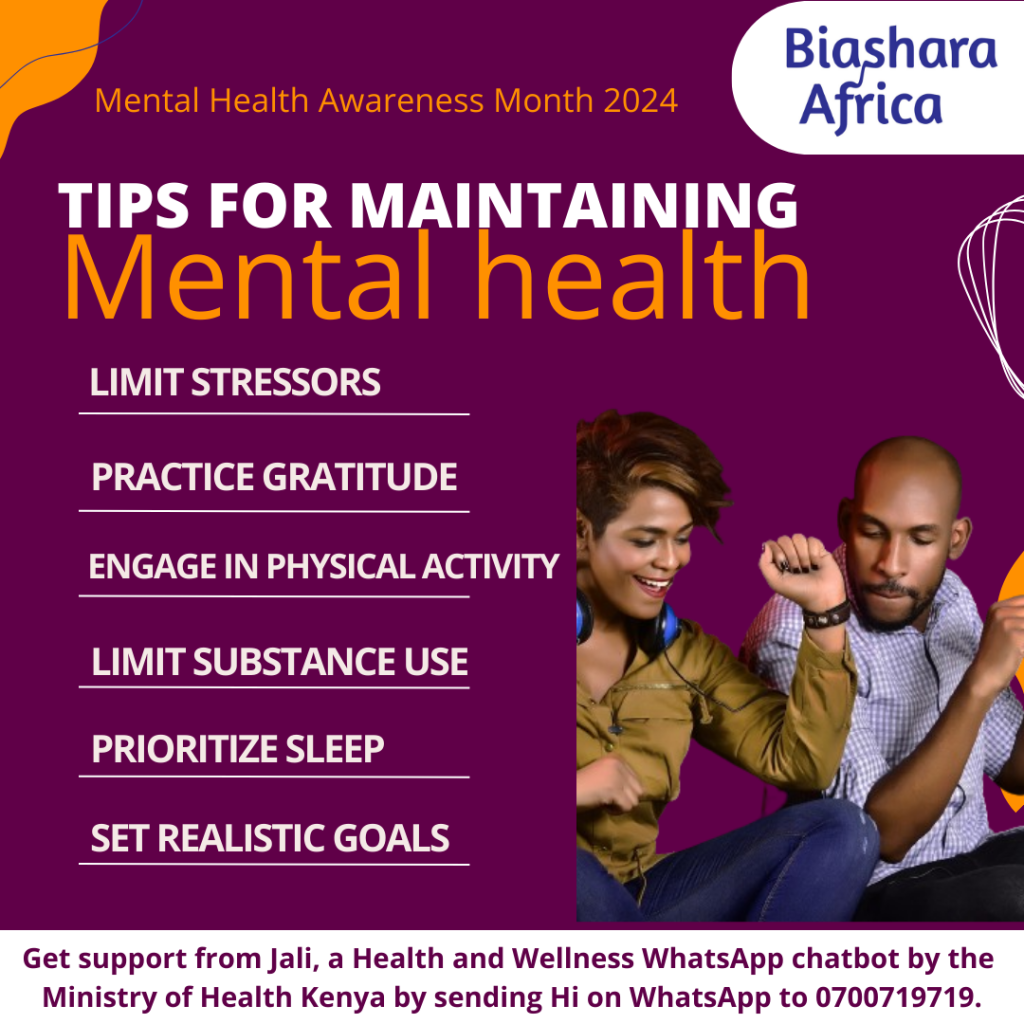31.05.2024 | Nairobi

May is Mental Health Awareness Month, a national observance that brings attention to the importance of mental wellbeing. In this article, we highlight ways of handling mental distress that require a combination of strategies to address both the immediate symptoms and underlying causes.
Here are some top ways to manage mental distress effectively:
1. Deep Breathing and Relaxation Techniques: Practice deep breathing exercises, progressive muscle relaxation, or mindfulness meditation to calm the mind and body during moments of distress.
2. Reach Out for Support: Talk to a trusted friend, family member, or mental health professional about your feelings and experiences. Sharing your emotions can provide validation, perspective, and comfort.
3. Engage in Physical Activity: Exercise releases endorphins, which can improve mood and reduce feelings of stress and anxiety. Even a short walk or gentle yoga session can have positive effects on mental well-being.
4. Limit Stressors: Identify and minimize sources of stress in your life, whether they’re related to work, relationships, or other obligations. Setting boundaries and prioritizing self-care can help prevent overwhelm.
5. Practice Self-Compassion: Treat yourself with kindness and understanding, especially during challenging times. Accept that it’s okay to feel distressed and offer yourself the same compassion you would give to a friend in need.
6. Establish a Routine: Creating structure and predictability in your daily life can provide a sense of stability and control, which is especially helpful during periods of distress.
7. Healthy Distractions: Engage in activities that you enjoy and that can help shift your focus away from negative thoughts and emotions. This could include hobbies, listening to music, watching a movie, or spending time with pets.
8. Seek Professional Help: If mental distress persists or interferes with your daily functioning, consider reaching out to a therapist, counselor, or psychiatrist for professional support and guidance.
9. Practice Mindfulness: Cultivate awareness of the present moment without judgment. Mindfulness practices can help you observe your thoughts and feelings without getting overwhelmed by them.
10. Limit Substance Use: Avoid using alcohol, drugs, or other substances as a way to cope with mental distress, as they can exacerbate symptoms and lead to additional problems.
11. Prioritize Sleep: Aim for regular sleep patterns and create a relaxing bedtime routine to improve sleep quality. Sufficient rest is essential for mental health and resilience.
12. Healthy Nutrition: Eat a balanced diet rich in fruits, vegetables, whole grains, lean proteins, and healthy fats. Nutritious food can positively impact mood and overall well-being.
13. Set Realistic Goals: Break tasks into smaller, manageable steps, and focus on achievable goals. Celebrate your accomplishments along the way, no matter how small they may seem.
14. Connect with Nature: Spend time outdoors and connect with the natural world. Nature has a calming effect on the mind and can help reduce feelings of distress and anxiety.
15. Practice Gratitude: Regularly reflect on things you’re grateful for, even during difficult times. Cultivating a mindset of gratitude can shift your perspective and enhance resilience in the face of adversity.
Remember that managing mental distress is a journey, and it’s okay to seek support and try different strategies to find what works best for you.
Get support on your wellness by chatting with Jali, a Health and Wellness WhatsApp chatbot by the Ministry of Health Kenya by sending Hi on WhatsApp to 0700719719 or click here https://api.whatsapp.com/send/?phone=%2B254700719719&text&type=phone_number&app_absent=0.
